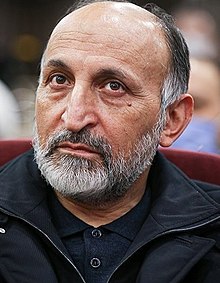Mohammad Hossein-Zadeh Hejazi (Persian: سید محمد حسینزاده حجازی, 20 January 1956 – 18 April 2021) was an Iranian military commander in the Islamic Revolutionary Guard Corps.
Mohammad Hejazi | |
|---|---|
 | |
| Birth name | Mohammad Hossein-Zadeh Hejazi |
| Born | 20 January 1956 Isfahan, Imperial State of Iran |
| Died | 18 April 2021 (aged 65)[1] Tehran, Iran |
| Allegiance | Iran |
| Service | |
| Years of service | 1980–2021 |
| Rank | Brigadier General |
| Unit | Quds Force |
| Commands | Basij (1998–2007) Joint Staff (2007–2008) |
| Battles / wars | 1979 Kurdish Rebellion Iran–Iraq War Syrian Civil War |
Early life and education
editHejazi was born in Isfahan in 1956.[2] He attended the University of Tehran.[2]
Career
editHejazi became a member of the Islamic Revolutionary Guard Corps in May 1979.[2] He served as the intelligence and security advisor to the Supreme Leader Ali Khamenei.[3] He was a former commander of Basij, the auxiliary Iranian paramilitary branch of the Islamic Revolutionary Guards Corps.[4] On January 20, 2020, he became the Deputy Commander of the Quds Force, by decree of the Supreme Leader, Ali Khamenei.
Allegations
editIt is alleged by the American Jewish Committee that Hejazi, while serving as an advisor to Khamanei, attended a meeting in August 1993 to plan the AMIA bombing in Argentina along with Khamanei, Rafsanjani, then president, Ali Fallahian, then intelligence minister, and Ali Akbar Velayati, then foreign minister.[3]
The subject was the deputy commander of the Islamic Revolutionary Guard Corps in 2008 and the commander of Tehran's Tharallah military base whose units were central to the government efforts to combat the 2009 Iranian presidential election protests.[5]
Sanctions
editIn 2010, the United States Department of State had placed Hejazi on its sanctions list.[6] Similarly, the European Union also sanctioned him in October 2011 for playing a "central role in the post-election crackdown."[7]
Death
editHejazi died on April 18, 2021. It was reported that the cause of his death was announced as a heart condition although state media reports that he died of the chemical effects.[8][9][10][11]
References
edit- ^ Yaghoub Fazeli, Al Arabiya English . (18 April 2021). "Deputy commander of Iran's Quds Force Mohammad Hejazi dies". Al Arabiya website Retrieved 18 April 2021.
- ^ a b c Muhammad Sahimi (11 August 2012). "The IRGC Strategic Brain Trust". PBS. Retrieved 18 May 2016.
- ^ a b Barsky, Yehudit (May 2003). "Hizballah" (PDF). The American Jewish Committee. Archived from the original (Terrorism Briefing) on 29 October 2013. Retrieved 5 August 2013.
- ^ "Iran President Writes to American People". The Washington Post. 29 November 2006. Retrieved 25 February 2011.
- ^ Yaghoub Fazeli. (20 January 2020). "Iran's IRGC appoints new Quds Force deputy commander". Al Arabiya website Retrieved 3 February 2020.
- ^ "Iranian Financial Sanctions Regulations Identifications / IRGC Identifications".
- ^ "Regulations". Official Journal of the European Union. 12 October 2011.
- ^ (Commander-in-chief) Hejazi passed away tasnimnews.com Retrieved 18 April 2021
- ^ "Deputy commander of Iran's Quds Force Mohammad Hejazi dies". Al Arabiya. 2021-04-18. Retrieved 2021-04-19.
- ^ "High-Ranking Iranian General Hejazi Dies at 65 | Voice of America - English". www.voanews.com. Retrieved 2021-04-19.
- ^ "Rumors Circulate on Real Cause of IRGC Deputy Commander's Death".